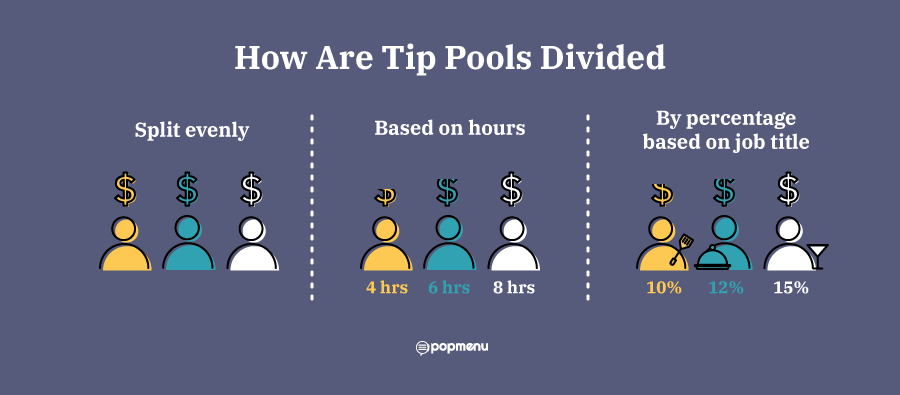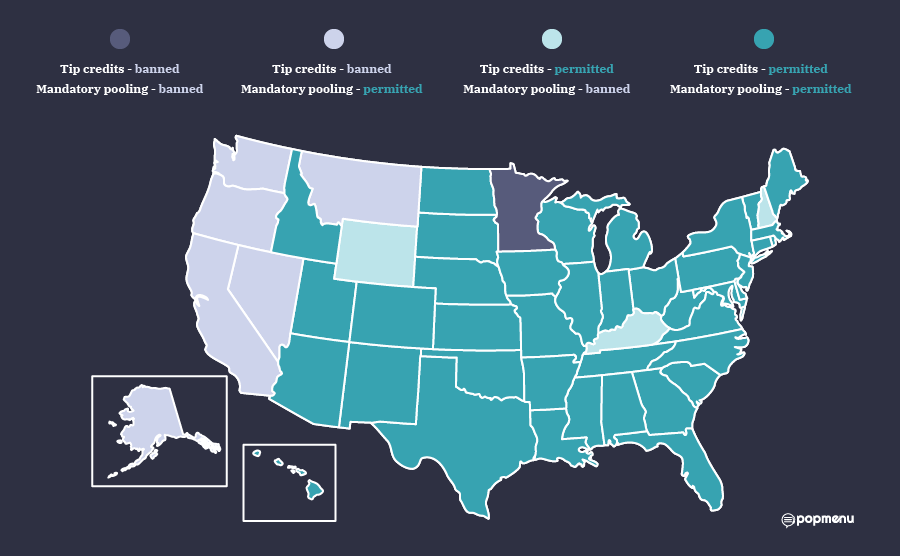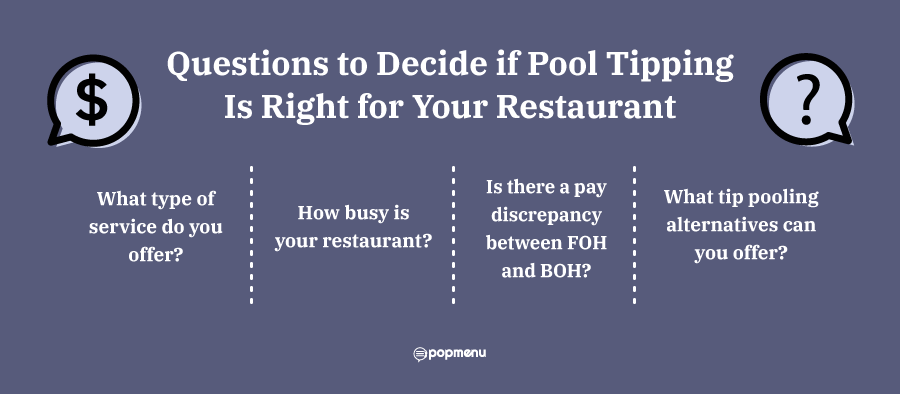Of all the issues you'll face while running a restaurant, tip pooling might be the most controversial. Ask any restaurant staff how they feel about this practice, and answers are likely to be across the board. Does tip pooling help make wages more fair for everyone in the restaurant? Or does it just take away from the most experienced and hardest working members of your staff?
These questions can make tip pooling seem like a bit of a gray area, because in many cases, the practice is legal. But is it ethical? And more importantly, how do real restaurant workers feel about it?
Read on for everything you need to know about tip pooling, the laws surrounding it, and how to decide if it's right for your restaurant.
What Is Tip Pooling?
Tip pooling is the practice in which all or a portion of the tip money made each day is collected and redistributed, instead of each server keeping the tips they earned individually.
A simple form of tip pooling that you've likely seen is when a cafe has a tip jar on its counter. In this kind of environment, tip pooling is more common, since check sizes tend to be smaller than in a full-service restaurant, and it helps make sure that everyone, from the cashier to the barista, gets a share of the tips for the work they do to prepare and serve each guest's order.
How Does Tip Pooling Work?
Tip pooling can look a few different ways.

Tips might be split evenly among all staff on shift, like when divvying up tips from a cafe tip jar, they might be collected by management and then distributed based on hours worked, or they can be paid based on percentages; for example, a host earns 10 percent of the night's tips, while a bartender earns 15 percent.
In some cases, tip pooling only involves the employees who earn tips to begin with—tips are collected and then redistributed among servers, hosts, and bartenders. But in some restaurants, tip pooling also includes employees who don't traditionally earn tips, like the kitchen staff.
Tip Pooling Pros
- Tip pooling is meant to act as a sort of equalizer. Kitchen staff don't typically receive gratuities, which often means waitstaff have more opportunities to earn higher wages. Tip pooling can help close that gap by increasing wages for the back of the house and incentivizing kitchen workers to be a part of offering excellent experiences for guests.
- Pooled tips can encourage teamwork. When servers agree to split tips, it's a good indication that they trust one anothers' skills and believe that they can work better as a team than they can as individuals.
- Tip pooling can simplify the restaurant's accounting. Especially when many guests pay with cards, it can take quite a bit of accounting to figure out how much each employee is taking home in tips, one by one. Pooling tips and paying them out evenly or by percentage can simplify this process, helping employees receive their tips faster.
- As online food orders and delivery have risen sharply in popularity, tip pooling helps solve challenging questions about how to fairly distribute tips paid on those orders.
Tip Pooling Cons
- Even though tip pooling is designed to make a restaurant's work environment more fair, it doesn't always work that way. Depending on how a restaurant divides tips, tip pooling could mean a hardworking server earns the same as one who takes a lot of breaks, which can breed resentment among staff.
- Tip pooling also has a bit of a bad reputation, thanks to a few bad apples that have exploited the practice—and their workers. There are all kinds of horror stories about restaurant managers who use tip pooling as an excuse to underpay everyone on their staff, since many states allow tips to count toward the minimum wage. There are also plenty of stories of managers who use tip pooling to take a cut of the tips for themselves. These types of scenarios have created an air of distrust around the entire practice of tip pooling, even for restaurants that use the practice correctly, legally, and with good intentions.
Is Tip Pooling Legal?
In short, yes. But, of course, the real answer is more complicated than that.
Tip pooling—at least in some form—is allowed across the U.S. under federal law. In 2018, the Trump administration moved to issue new rules under the Fair Labor Standards Act (FLSA) that would permanently allow back-of-house workers to receive tips as part of pools. Since then, the Biden administration has asked the Department of Labor to freeze proposed changes to the FLSA while new leaders review the pending rules.
In the U.S., there's nowhere where tip pooling is expressly forbidden by federal law. There are, however, a number of states that have passed their own laws that prohibit mandatory tip pooling. In other words, tip pooling is allowed, but employers can't force their workers to participate.

There are also rules around tip pooling while also taking the "tip credit," which allows restaurants to pay their workers less than minimum wage as long as their tips make up the difference. Under the Trump administration's proposed rules, restaurants would not be allowed to take the tip credit while also pooling their workers' tips. Many states have their own rules about whether restaurants are allowed to take the tip credit, whether they pool tips or not.
In addition to state laws, counties, cities, and other local governing bodies can create their own rules around tips, credits, pooling, and other issues affecting restaurant management. Before making any changes to your restaurant's tipping practices, it's essential to thoroughly research laws in your area, and to consult an employment attorney if you aren't sure what's allowed.
When researching whether tip pooling is allowed in your area, pay close attention to whether there are conditions surrounding it. For example, your state or local laws may dictate:
- Which roles can be included in a tip pool.
- Whether there are notice requirements for changing your tipping practices.
- Whether you're required to have a written tip pooling agreement between staff and management.
Is Tip Pooling Ethical?
This is, of course, the much harder question to answer.
Often, the motivation behind a restaurant owner or manager's decision to pool tips is good. They want to offer equitable wages to their entire staff, including those who work in the kitchen. They want to encourage teamwork and collaboration and streamline their tipping process so they can pay out tips faster.
But even the best of intentions can have unintended consequences. Tip pooling doesn't always come out to be a net positive for the entire restaurant staff.
What Do Restaurant Employees Think About Tip Pooling?
Haleigh Huffman, a former server at Mugshots Bar and Grill in Covington, Louisiana, said her restaurant started pooling tips after reopening during the COVID-19 pandemic.
"It was a very negative situation," she said. "I don't think it's ethical or should be allowed. It allowed people who were generally less hard working to reap the benefits of those staff members who were incredibly hard workers."
Amy Merrill, a former server who worked in a number of restaurants in Boise, Idaho, has more complicated feelings about tip pooling.
"It's common in my experience for bartenders to pool tips for bar top service and tip outs from waitstaff, but if they serve any tables, they keep it in full. I have no issue with any of this," she said. "I do have an issue with servers pooling tips. Theoretically, I understand that it can serve to make everyone's wage the same, but that's also the issue, isn't it? At its core, the service industry expressly provides a platform for people to use every asset in their inventory to earn to their max potential. The effort is ultimately up to the individual. And in non-corporate restaurants, often the total number of tables a person is given can depend on their level of skill."
How to Decide Whether to Pool Tips in your Restaurant
Considering how controversial the topic can be—and the mixed opinions of industry workers—how can you know whether tip pooling is the right practice for your restaurant?
First and foremost, realize that your staff members are the people who are going to be most affected by any changes to your tipping practices. Therefore, it's absolutely essential to allow them to be part of the conversation around tipping practices, and to weigh in and ask questions about any changes that are on the table. Try to keep conversations as open and transparent as possible, while recognizing that talking about changes to how your employees get paid could create an emotionally charged atmosphere.
Alongside open conversations with your staff, consider these questions.

What Type of Service Do You Offer?
Some types of restaurant service are more conducive to tip pooling than others. Like the cafe example we explored above, any type of restaurant that offers counter service (rather than full service at the table) is a good candidate for tip pooling.
When considering this question, also consider whether you do a lot of delivery or takeout orders. Tip pooling can be a good way to distribute tips from off-site orders, when there isn't one employee providing direct service for that order.
How Busy Is Your Restaurant?
Is your restaurant consistently slammed, or are there certain days or shifts that are reliably busy while others tend to be slow? These are more factors to consider—during a very busy shift, the kitchen staff works extremely hard. It's not necessarily fair for servers and other FOH staff to reap the benefits of an extremely busy shift in the form of increased tips, while the kitchen earns no more than they would during a less stressful, slow shift, for example.
Is There a Pay Discrepancy Between FOH and BOH?
One of the biggest factors you should consider is whether there's a pay discrepancy between your FOH staff and BOH staff, and if there is, how large it is.
Having servers earn considerably more than kitchen staff (or vice versa) can create resentment among your team. This can be exacerbated if the reason for the discrepancy is that servers earn a lot from tips, while BOH staff don't. In these cases, it's necessary to explore ways to create more equity in your team's pay, though tip pooling isn't necessarily your only option.
What Tip Pooling Alternatives Can You Offer?
That brings us to the final consideration, which is whether you can solve pay equity problems without tip pooling. Can you offer higher wages to non-tipped employees? What about salaries or benefits? Is it possible to do away with tipping in your restaurant altogether, and instead charge guests a service fee that allows you to provide living wages and benefits to everyone on your staff?
Tip Pooling Is Controversial, but It Can Be Done Ethically
By involving your entire staff in decisions about tipping practices, and carefully considering all the questions posed in this article, tip pooling can be done both legally and ethically.
Ultimately, the right answer for one restaurant may not be right for another, so using this article as a guide is a good first step for owners and managers to start moving toward a decision that's right for you—and your staff.


.jpeg)







